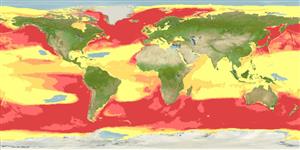Common names from other countries
Environment: milieu / climate zone / depth range / distribution range
Ecologia
Pelágico(a,os,as); oceanódromos (Ref. 75906); intervalo de profundidade 0 - 230 m (Ref. 1005). Tropical; 90°N - 90°S, 180°W - 180°E
Circumglobal except the Arctic: Balaenoptera physalus physalus: Svalbard, Barents Sea, North Carolina, Portugal, Cantabrian Sea, Newfoundland, Gulf of Mexico, Greater Antilles, Faroe Islands, Norway, Canary Islands, Sea of Okhotsk, Kuril Islands, Bering Sea, Chukchi Sea, Gulf of Alaska, Sea of Japan, Japan, Taiwan, Ogasawara, Hawaii, California, Baja California, Gulf of California; Balaenoptera physalus quoyi: Ross Ice Shelf, Brazil, Gabon, Angola, Namibia, South Africa, Madagascar, Western Australia, New Zealand, Colombia, Peru, Chile (Ref. 1522).
Length at first maturity / Tamanho / Peso / Idade
Maturity: Lm ? range ? - ? cm Max length : 2,700 cm TL macho/indeterminado; (Ref. 1394); Peso máx. publicado: 75.0 t (Ref. 1394)
The largest of the fin whales. Seen near shore, most commonly where deep water approaches the coast. Feeds on small invertebrates, schooling fishes, and squid. They are active lunge feeders (Ref. 1394). They are preyed upon by great white sharks (Ref. 32140). Following depletion of blue whale stocks, whalers shifted their attention to fin whales. Populations everywhere were substantially reduced. At present the worldwide population does not seem to appear in any immediate danger (Ref. 1394). Minimum depth from Ref. 116169.
Jefferson, T.A., S. Leatherwood and M.A. Webber. 1993. (Ref. 1394)
Status na Lista Vermelha da IUCN (Ref. 130435: Version 2024-1)
Status no CITES (Ref. 108899)
Uso pelos humanos
Pescarias: espécies comerciais
FAO - pescarias: landings, perfil da espécie | FishSource | Sea Around Us
Ferramentas
Fontes da internet
Estimates based on models
Preferred temperature
(Ref.
115969): 0.2 - 4.6, mean 1.5 (based on 25596 cells).
Resiliência
Médio, tempo mínimo de duplicação da população 1,4 - 4,4 anos (K=0.25-0.27; tm=17.5).
Vulnerabilidade
Very high vulnerability (76 of 100).
Categoria de preço
Unknown.
